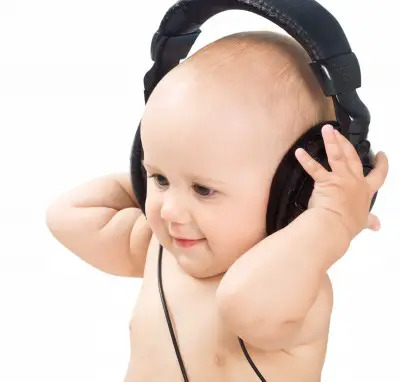A local music therapist and special educator explains why parents should sing to their children, the benefits of singing for your child’s learning and development, and how even “non-musical” parents can easily create and sing fun songs that their children will respond to.
 “Why would you want to sing with your kids and why does it work so well?
“Why would you want to sing with your kids and why does it work so well?
A partial answer is that singing stimulates multiple parts of the brain simultaneously. More sections of the brain are activated when a direction or concept is sung rather than spoken. It makes the job at hand (i.e. emptying the dishwasher) more interesting and seem like less of an adult demand.
And singing can help with speech development. Think of how musical speech is: It has a proper rate (tempo), a proper dynamic (volume), expected inflections (pitches), give and take (conversations), proper phrase length, expected phrase maintenance, sound vs. silence-just to name a few.
My first premise is that anyone can sing! I’ve had 25 years of music experience and I must say that there are very few people (if any) who really “can’t sing” or who are really “tone deaf.” My advice: Sing anyway.
Here’s what you do: Take a traditional children’s song and stick different words into it to make it your own. That’s it. You do not need to be clever. You do not need to rhyme. Just choose a few words and sing the same phrase over and over.
Examples:
– To help kids clean up, you can take the tune from “Wheels on the Bus” and sing “Play time is over and it’s time to clean, time to clean, time to clean. Play time is over and it’s time to clean. Clean up the toys.”
– If you’re teaching toddlers about body parts, take the song “If You’re Happy and You Know It” and replace the words with: “Put the washcloth on your head, on your head, on your head. Put the washcloth on your head, on your head.”
– Back to “Wheels on the Bus”: To help peers learn names and foster awareness of syllables, sing, “Let’s sing hi to Monica (while clapping the syllables: Mo-ni-ca), Monica, Monica. Let’s sing hi to Monica. Hmmm who’s next?”
You can sing to help your child develop social skills, daily routines, language concepts, math skills, vocabulary, and more. Music grabs our attention and opens us up to new concepts about the world around us, ourselves, and other people. So go ahead and sing!”
Margie La Bella is a music therapist and special educator in Suffolk County, Long Island, and works with young children with special needs. Her website (www.musictherapytunes.com) includes more information for parents and teachers, music therapy CDs, lesson plans, activity videos, and more.
Also see: Ask the Expert: How ‘Worth It’ Are Singing Lessons for Kids?



















